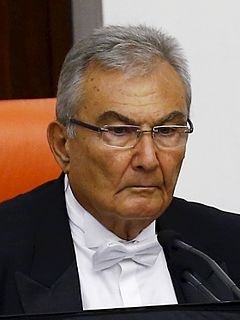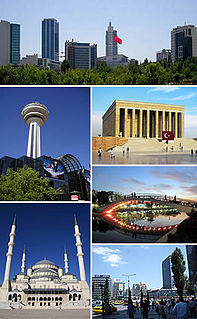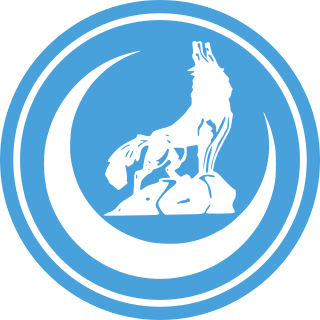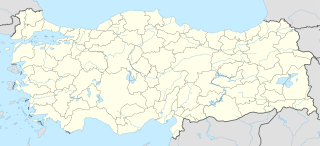
The Republican People's Party is a Kemalist and social-democratic political party in Turkey. It is the oldest political party in the country, and is currently the main opposition in the Grand National Assembly. The CHP describes itself as "a modern social democratic party, which is faithful to the founding principles and values of the Republic of Turkey". The party is cited as "the founding party of modern Turkey". Its logo consists of the Six Arrows, which represent the foundational principles of Kemalism: republicanism, nationalism, statism, populism, laicism, and reformism.
Ahmet Mesut Yılmaz is a Turkish politician. He was the leader of the Motherland Party from 1991 to 2002, and served three times as Prime Minister of Turkey. His first two prime-ministerial terms lasted just months, while the third ran from June 1997 to January 1999. The first was brought to an end by defeat in the 1991 elections, the latter two by the breakdown of Yılmaz' coalition governments.

Deniz Baykal is a Turkish politician at the Republican People's Party (CHP) who served as Deputy Prime Minister and Minister of Foreign Affairs from 1995 to 1996. Having served in numerous government positions, Baykal led the CHP from 1992 to February 1995, from September 1995 to 1999 and again from 2000 to 2010. Between 2002 and 2010, he also served as the Leader of the Opposition by virtue of leading the second largest party in Parliament.

The Turkish general election of 2007 was held on July 22, 2007 to elect 550 members to the Grand National Assembly. The election was the 22nd general election to be held in the history of the Turkish Republic and the members elected formed the 23rd Parliament of Turkey.

Turkey's 13th general election was held on Sunday December 24, 1995, triggered by the newly re-established Republican People's Party's (CHP) withdrawal from a coalition with the True Path Party (DYP). The coalition had been in government for four years, having been formed by the Social Democratic Populist Party, the CHP's predecessor.

Turkey held local elections on 29 March 2009. The overall winner was the ruling party Justice and Development Party, although the party saw a decline in its vote relative to the 2007 general election. The leading opposition party, the social democratic Kemalist CHP, increased its vote share, as did a number of smaller parties including the SP, DTP and BBP, whose party leader Muhsin Yazıcıoğlu had died in a helicopter crash four days before the election. The third largest party, the Turkish nationalist MHP, enjoyed a more modest vote surge. The election was not contested by Cem Uzan's GP. The AKP failed to take certain provinces it had publicly targeted, such as Diyarbakır, İzmir and Urfa, and did not achieve its goal of exceeding 47% of the overall vote. There was localized election-related fighting in southeastern Turkey, in which five people were reported to have been killed and about a hundred injured.
Yıldırım Aktuna was a Turkish psychiatrist, politician, district mayor and government minister in a number of cabinets.

Meral Akşener is a Turkish politician. She served as Minister of the Interior and was a vice-speaker of the Parliament. In 2016, she led a group of opposition within the Nationalist Movement Party (MHP) against its leader Devlet Bahçeli. On 25 October 2017, she founded the İyi Party, of which she is the leader.

The Turkish local elections of 2004 were held throughout the eighty-one Provinces of Turkey on 28 March 2004 in order to elect both mayors and councillors to local government positions. All 16 metropolitan and 3,193 district municipalities were up for election, while 3,208 provincial and 34,477 municipal councillors were also elected. More than 50,000 neighbourhood presidents (muhtars) were also elected, though these do not have any political affiliations.
The outcome of the Turkish general elections after 1983 is shown below. In the table below only the percentage of the votes received by the parties which were qualified to send representatives to the parliament are shown. So the summation of percentages may be lower than 100%. The winner is shown in color. The legend of abbreviations is shown at the end of the table.
The outcome of the Turkish local elections after 1980 is shown below.. In the local elections in addition to mayors and muhtars, members of local parliaments are elected. The voter base of the local parliaments and the national parliament is assumed to be identical. In the table, only those parties which received more than 1% are shown.
The outcome of the elections for Metropolitan municipalities in Turkey is shown below. The number of metropolitan centers was three in 1984 and eight in 1989. In 1994 the number increased to 15 and in 2004 to 16. In 2014 14 new metropolitan municipalities were established. The abbreviations for the names of the parties are shown in section Abbreviations.
Women in Turkey have an active participation in national politics, and the number of women in the Turkish parliament has been increasing steadily in recent elections.
Celal Adan is a Turkish politician. He was elected in 2011 to the 24th Grand National Assembly of Turkey for the Nationalist Movement Party (MHP). Adan had previously represented the True Path Party (DYP) in the 21st Assembly, and later been the party's deputy chairman.
Mustafa Murat Sökmenoğlu was a Turkish politician who was a parliamentary deputy from 1983 to 1989 and from 1999 to 2002.
The 55th government of Turkey was a coalition government led by Mesut Yılmaz of Motherland Party. Coalition partners with Motherland Party were Democratic Left Party (DSP) and Democrat Turkey Party (DTP). The government was nicknamed Anasol-D, where "Ana" refers to ANAP, sol (left) refers to DSP, and D refers to DTP.
Events in the year 1999 in Turkey

İsmet Sezgin was a Turkish politician who served as the Deputy Prime Minister of Turkey and Minister of National Defence from 1997 to 1999, as the Speaker of the Grand National Assembly in 1995, as the Minister of the Interior from 1991 to 1993, as the Minister of Finance from 1979 to 1980 and as the Minister of Youth and Sports from 1969 to 1971. Between 1999 and 2002, he served as the Leader of the Democrat Turkey Party, but did not contest any elections.
Hüsamettin Özkan is a former Turkish politician who served as the Deputy Prime Minister of Turkey between 1999 and 2002 in the 56th and 57th governments led by Prime Minister Bülent Ecevit. He was a Member of Parliament for İstanbul's second electoral district from the Democratic Left Party (DSP) from 1991 to 2002. He was also a Minister of State during the coalition government led by Motherland Party (ANAP) leader Mesut Yılmaz between 1997 and 1999.
The Nation Alliance, or simply Nation, is an electoral alliance in Turkey, formed to contest the country's 2018 general election. The alliance was officially launched on 1 May 2018, and consists of four opposition parties, namely the Republican People's Party (CHP), the İyi Party (İYİ), the Felicity Party (SP), and the Democratic Party (DP). The constituent parties of the Nation Alliance are set to contest the parliamentary election under a common banner, while each individual party is expected to nominate its own candidate for the presidential election.














